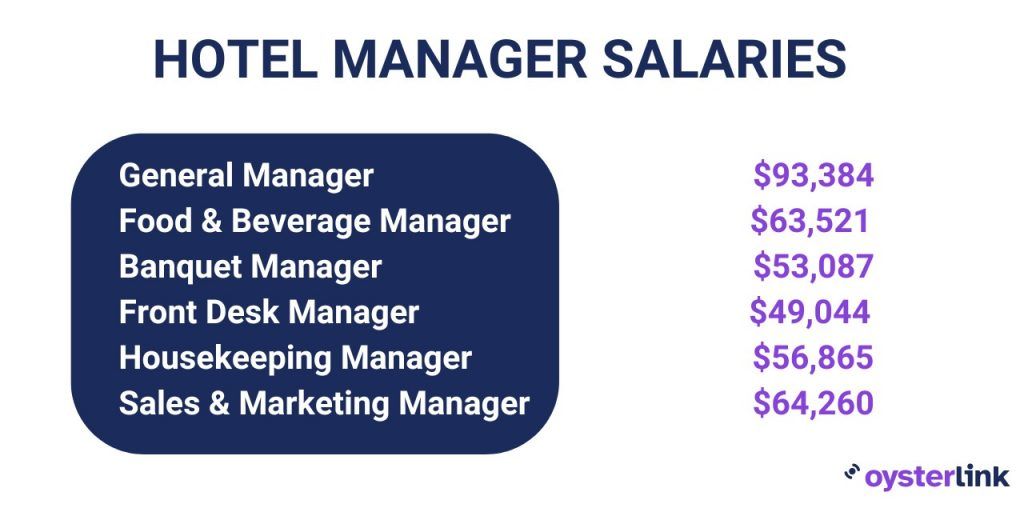How To Become a Hotel Manager: Step-by-Step Guide
The best Hotel Managers are skilled in financial management, customer service and team leadership. If you’re interested in becoming one, this step-by-step guide is for you.
Four-Step Guide To Becoming a Hotel Manager
Hotel Managers are known to have a broad skill set, given the range of responsibilities they need to handle in order to successfully run a hotel. This includes tasks such as monitoring budgets, managing guest complaints and hiring hotel staff.
Given the demands of the role, the pathway to becoming a Hotel Manager combines formal education, extensive hands-on experience and continuous skill development.
Below, we’ve listed the steps to become a Hotel Manager.
1. Earn a hospitality degree
Most Hotel Manager employers in the U.S. prefer candidates with either an associate’s or bachelor’s degree.
A hospitality degree offers access to various career options, provides you with valuable skills and gives you an edge over other candidates.

If you’re wondering which are the top hotel management schools in the country, here are some of them and their respective degree offerings:
- Cornell Univesity - Bachelor of Science in Hotel Administration
- University of Nevada - Bachelor of Science in Hotel Management
- Boston University - Bachelor of Science in Hospitality Administration
- Purdue University - Bachelor of Science in Hospitality and Tourism Management
- Michigan State University - Bachelor of Arts in Hospitality Business
Obtaining a degree can be expensive.
To save money, you can opt to enroll in a community college for an associate degree and then transfer your credits to a larger institution if you’re after the prestige of a more prominent school.
2. Gain experience by working in an entry-level role in a hospitality establishment
Entry-level jobs such as Housekeeper and Porter provide you with skills that are important for becoming an effective Hotel Manager and offer valuable insights into different aspects of hotel operations.
Being employed as a Housekeeper develops your time management skills. Since Housekeeper duties involve multiple cleaning activities, you’ll learn how to prioritize tasks efficiently.
This skill is important for aspiring Hotel Managers who must balance many responsibilities, from handling staff training and preparing budget reports to developing marketing strategies and negotiating contracts with vendors.

Meanwhile, working as a Porter enhances your coordination skills. Porters often need to coordinate with guests to assist with their luggage, bell services for proper luggage storage and transportation and front desk staff to ensure seamless check-ins and check-outs.
As a Hotel Manager, you also need to coordinate not just with guests and hotel staff but also with external service providers. For example, you may need to contact maintenance contractors to fix a slow-moving elevator to ensure a positive guest experience.
In addition to acquiring these skills and knowledge, working in these entry-level roles helps you meet the 3 to 5 years of industry experience required by most employers.
3. Obtain relevant certifications (optional)
The American Hotel & Lodging Educational Institute (AHLEI), an organization dedicated to furthering the education of hospitality professionals, offers a range of certifications for aspiring Hotel Managers:
- Certified Hospitality Supervisor: Teaches conflict management, quality guest service and communication skills
- Certified Hospitality Manager: Guides Hotel Managers in building successful teams, running a profitable establishment and enhancing overall operational efficiency
- Certified Hotel Administrator: Ideal for both managerial and executive-level hospitality professionals who seek recognition for expertise in leadership, revenue management and human resources
Certifications boost your resume by providing tangible proof of your qualifications in hotel management.
3. Apply for hotel management positions
Find Hotel Manager positions on job boards, in industry resources like Lodging Magazine and through networking once you have gained solid experience and skills.
When sending applications, make sure that your resume is tailored specifically to the job description of the potential employer. Include a cover letter if required to further highlight your skills.
Once you secure an interview, prepare for common Hotel Manager interview questions to make a good first impression and effectively emphasize why you’re the perfect candidate.
Types of Hotel Managers
There are six different major types of Hotel Managers.
These positions are commonly seen in larger hotels, where specialized professionals are needed to manage specific areas.

[Source: OysterLink salary data]
General Manager
Performing well in the role of a Hotel Manager gives you the opportunity to advance to a Hotel General Manager position.
General Managers are in charge of the overall hotel operations, including all the departments led by the managers we’ll discuss below.
Average salary: $93,384 per year
Food & Beverage Manager
A Food & Beverage Manager supervises all restaurants, bars and cafeterias — anything that serves food and drinks within the hotel. Their responsibilities involve coordinating with third-party vendors regarding ingredient purchases, managing inventory and pricing of food and drinks.
Average salary: $63,521
Banquet Manager
A Banquet Manager handles all events held in the hotel. If there are conferences, occasions or gala dinners, they’re in charge of ensuring the venue layout is according to the customers’ needs, that meals and drinks are delivered promptly and that the budget is managed effectively.
Average salary: $53,087
Front Desk Manager
Front Desk Managers manage customer-facing entry-level roles like Receptionists and Concierges. They make sure that the processes of checking in, checking out and addressing any guest requests are followed excellently.
Average salary: $49,044
Housekeeping Manager
A Housekeeping Manager, also known as Head Housekeeper, hires, trains and leads the housekeeping staff. They make sure that all rooms, facilities and amenities in the hotel meet the cleanliness, orderliness and sanitation standards.
Average salary: $56,865 per year
Sales & Marketing Manager
A Sales & Marketing Manager sets revenue goals for the year and develops plans and strategies to achieve them. They monitor industry trends, study competitors and identify market opportunities to attract new customers, encourage customer loyalty and increase market share.